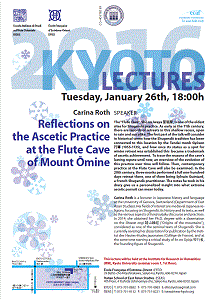
Kyoto Lectures 2016-01-26
26 JANVIER 16
Title: Reflections on the Ascetic Practice at the Flute Cave of Mount Ōmine
Speaker: Carina Roth (University of Geneva)
2016 Tuesday, January 26th, 18:00h
École Francaise d'Extrême-Orient EFEO
Scuola Italiana di Studi sull'Asia Orientale ISEAS
(European Consortium for Asian Field Study, ECAF)
co-hosted by Institute for Research in Humanities, Kyoto University
This lecture will be held at the Institute for Research in Humanities (IRH), Kyoto University (seminar room 1, 1st floor)
The
"Flute Cave", Shō no Iwaya 笙岩屋, is one of the oldest sites for Shugendō
practice. As early as the 11th century, there are records of retreats
in this shallow recess, open to rain and sun alike. The first part of
the talk will consider in historical terms how the Shugendō tradition
has been connected to this location by the Tendai monk Gyōson 行尊
(1055-1135), and how once its status as a spot for winter retreat was
established this became a trademark of ascetic achievement. To trace the
reasons of the cave's lasting repute until now, an overview of the
evolution of this practice over time will follow. Then, contemporary
practice at the Flute Cave will also be examined. In the 20th century,
three monks performed a full one-hundred days retreat there, one of them
being Sylvain Guintard, a French Shugendō practitioner. The notes he
took in his diary give us a personalized insight into what extreme
ascetic pursuit can mean today.
Carina Roth is a lecturer in
Japanese history and language at the University of Geneva, Switzerland
(Department of East Asian Studies). Her fields of interest are medieval
Japanese religions, focusing on Shugendō, its history and its texts, as
well as the various aspects of honji suijaku discourse and practices. In
2014, she obtained her Ph.D. degree with a dissertation on the Shozan
engi 諸山縁起 ("Origins of the mountains"), considered as one of the seminal
texts of Shugendō. She is currently revising her dissertation for
publication by the Institut des Hautes Études Japonaises (Collège de
France), and at the same time starting a critical study of En no Gyōja
役行者, the founding figure of Shugendō.
For detailed directions:
http://www.zinbun.kyoto-u.ac.jp/e/institute/access-institute/access_e.htm
École Francaise d'Extrême-Orient (EFEO)
Phone: 075-701-0882
Fax: 075-701-0883
e-mail: efeo.kyoto@gmail.com
Italian School of East Asian Studies (ISEAS)
Phone: 075-751-8132
Fax: 075-751-8221
e-mail: iseas@iseas-kyoto.org
kyoto lectures
Speaker: Carina Roth (University of Geneva)
2016 Tuesday, January 26th, 18:00h
École Francaise d'Extrême-Orient EFEO
Scuola Italiana di Studi sull'Asia Orientale ISEAS
(European Consortium for Asian Field Study, ECAF)
co-hosted by Institute for Research in Humanities, Kyoto University
This lecture will be held at the Institute for Research in Humanities (IRH), Kyoto University (seminar room 1, 1st floor)
The
"Flute Cave", Shō no Iwaya 笙岩屋, is one of the oldest sites for Shugendō
practice. As early as the 11th century, there are records of retreats
in this shallow recess, open to rain and sun alike. The first part of
the talk will consider in historical terms how the Shugendō tradition
has been connected to this location by the Tendai monk Gyōson 行尊
(1055-1135), and how once its status as a spot for winter retreat was
established this became a trademark of ascetic achievement. To trace the
reasons of the cave's lasting repute until now, an overview of the
evolution of this practice over time will follow. Then, contemporary
practice at the Flute Cave will also be examined. In the 20th century,
three monks performed a full one-hundred days retreat there, one of them
being Sylvain Guintard, a French Shugendō practitioner. The notes he
took in his diary give us a personalized insight into what extreme
ascetic pursuit can mean today.
Carina Roth is a lecturer in
Japanese history and language at the University of Geneva, Switzerland
(Department of East Asian Studies). Her fields of interest are medieval
Japanese religions, focusing on Shugendō, its history and its texts, as
well as the various aspects of honji suijaku discourse and practices. In
2014, she obtained her Ph.D. degree with a dissertation on the Shozan
engi 諸山縁起 ("Origins of the mountains"), considered as one of the seminal
texts of Shugendō. She is currently revising her dissertation for
publication by the Institut des Hautes Études Japonaises (Collège de
France), and at the same time starting a critical study of En no Gyōja
役行者, the founding figure of Shugendō.
For detailed directions:
http://www.zinbun.kyoto-u.ac.jp/e/institute/access-institute/access_e.htm
École Francaise d'Extrême-Orient (EFEO)
Phone: 075-701-0882
Fax: 075-701-0883
e-mail: efeo.kyoto@gmail.com
Italian School of East Asian Studies (ISEAS)
Phone: 075-751-8132
Fax: 075-751-8221
e-mail: iseas@iseas-kyoto.org
kyoto lectures
2025
2024
2023
2022
2021
2020
2019
2018
2017
2016
DÉCEMBRE SEPTEMBRE AOÛT JUIN AVRIL JANVIER 2015
2014
2013
2012
2011
2010
2009
2008
anna seidel memorial lectures
architecture
bibliothèque
cahiers d'extrême-asie
chantier
chercheurs
concours
conférence
conférences
construction
inauguration
jôtôshiki
kyoto lectures
kyoto lectures
kyoto lectures
la conservation et la rénovation de l’architecture au japon
la conservation et la rénovation de l’architecture au japon
lecture series
news
nouvelles
paruations
parutions
prix
publications
visites
workshop
2024
2023
2022
2021
2020
2019
2018
2017
2016
DÉCEMBRE SEPTEMBRE AOÛT JUIN AVRIL JANVIER 2015
2014
2013
2012
2011
2010
2009
2008
anna seidel memorial lectures
architecture
bibliothèque
cahiers d'extrême-asie
chantier
chercheurs
concours
conférence
conférences
construction
inauguration
jôtôshiki
kyoto lectures
kyoto lectures
kyoto lectures
la conservation et la rénovation de l’architecture au japon
la conservation et la rénovation de l’architecture au japon
lecture series
news
nouvelles
paruations
parutions
prix
publications
visites
workshop

